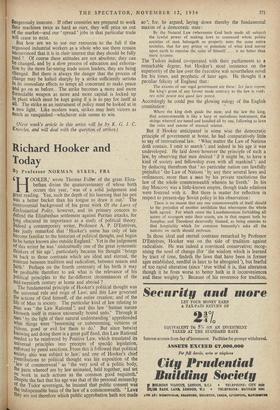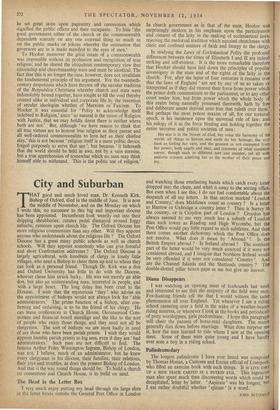Richard Hooker and
tly Professor NORMAN SYKES, FBA OOKER,' wrote Thomas Fuller of the great Eliza- bethan divine the quatercentenary of whose birth occurs this year, was of a solid judgement and great reading. Yea, such the depth of his learning that his pen Was a better bucket than his tongue to draw it out.' The Controversial background of his great work Of the Laws of Ecclesiastical Polity, however, and its primary concern to defend the Elizabethan settlement against Puritan attacks, for long obscured its importance as a study of political theory. Indeed a contemporary writer, Professor A. P. D'Entreves, has justly remarked that Hooker's name has only of late become familiar to the historian of political thought, and begun to be better known also outside England.' Yet in the judgement Of this writer he was undoubtedly one of the great systematic thinkers of his age ', particularly because his thought brings U s back to those contrasts which are ideal and eternal, the Contrast between tradition and radicalism, between reason and be Perhaps on the fourth centenary of his birth it may De profitable therefore to ask what is the relevance of his Political principles to the far-different circumstances of the mid-twentieth century at home and abroad ? The fundamental principle of Hooker's political thought was the universal rule and reign of Law; and this Law governed life actions of God himself, of the entire creation; and of the nfe of Man in society. The particular kind of law relating to 'Ilan was the Law Rational '; and this law'human nature knoweth itself in reason universally bound unto.' Through it Men by the light of their natural understanding' apprehended What things were beseeming or unbeseeming, virtuous or vicious, good or evil for them to do.' But since betwixt knowing and doing there is a great gulf fixed, this Law Rational needed to be reinforced by Positive Law, which translated its Universal principles into precepts of specific legislation, enforced by penal sanctions. From this it followed that political Society also was subject to law; and one of Hooker's chief Contributions to political thought was his exposition of the `law of commonweal' as the very soul of a politic body, the parts whereof are by law animated, held together, and set Zt work in such actions as the common good requireth.' tiespite the fact that his age was that of the personal monarchy of the Tudor sovereigns, he insisted that public consent was e indispensable basis of the law of a commonwealth. Laws Lney are not therefore which public approbation hath not made so '; for, he argued, laying down thereby the fundamental maxim of a democratic state :
By the Natural Law (whereunto God hath made all subject) the lawful power of making laws to command whole politic societies of men belongeth so properly unto the same entire societies, that for any prince or potentate of what kind soever upon earth to exercise the same of himself . . . is no better than mere tyranny.
The Tudors indeed co-operated with their parliaments to a remarkable degree; but Hooker's stout insistence on the Superiority of the law over the executive waS nevertheless novel for his times, and prophetic of later ages. He thought it a peculiar felicity of England that: The axioms of our regal government are these: lex fad: regem; the king's grant of any favour made contrary to the law is void: rex nihil pores: nisi quad lure [latest.
Accordingly he could pen the glowing eulogy of tha English constitution :
Where the king doth guide the state, and the law the king, that commonwealth is like a harp or melodious instrument, the strings whereof are tuned and handled all by one, following as laws the rules and canons of musical science.
But if Hooker anticipated in some wise the democratic principle of government at home, he had comparatively little to say of international law. What matter the Law of Nations doth contain, I omit to search '; and indeed in his age it was undeveloped. He laid down however the principle of such a law, by observing that men desired if it might be, to have a kind of society and fellowship even with all mankind '; and by deducing therefrom that no particular nation can lawfully prejudice' the Law of Nations by any their several laws and ordinances, more than a man by his private resolutions the law of the whole commonwealth wherein he liveth.' In his day Muscovy was a little-known empire, though trade relations were fostered with it. But there is matter for reflection in respect to present-day Soviet policy in his observation:
There is no reason that any one commonwealth of itself should to the prejudice of another annihilate that whereupon the whole hath agreed. For which cause the Lacecimmonians forbidding all access of strangers unto their coasts, are in that respect both by Josephus and Theodoret deservedly blamed, as being enemies to that hospitality which for common humanity's sake all the nations on earth should embrace.
In those ideal and eternal contrasts remarked by Professor D'Entreves, Hooker was on the side of tradition against radicalism. He was indeed a convinced conservative; recog- nising the need of change (for the wisdom which is learned by tract of time, findeth the laws that have been in former ages established, needful in later to be abrogated '), but fearful of too rapid alteration (since true withal it is, that alteration though it be from worse to better hath in it inconveniences and these weighty '). Because of his reverence for tradition. he set great store upon pageantry and ceremonies which dignified the public offices and their occupants. To him 'the good government either of the church or the commonwealth dependeth scarcely on any one external thing so much as on the public marks or tokens whereby the estimation that governors are in is made manif,est to the eyes of men.'
To Hooker moreover the good estate of a commonwealth was impossible without its profession and recognition of true religion; and he shared the ubiquitous contemporary view that citizenship and churchmanship were and must be identical. The fact that this is no longer the case, however, does not invalidate the fundamental principle of his argument. For the twentieth- century despotisms which have thrown off the sweular tradition of the Respublica Christiana whereby church and state were indissolubly bound together, have sought to fill the void thereby created alike in individual and corporate life by the invention of secular ideologies whether of Marxism or Fascism. To Hooker it was essential for 'Polity to acknowledge itself indebted to Religion,' since 'so natural is the union of Religion with Justice, that we may boldly deem there is neither where both are not.' But, although 'we have reason to think that all true virtues are to honour true religion as their parent and all well-ordered commonwealths to love her as their chiefest stay,' this is not because 'religion itself is a mere politic device, forged purposely to serve that use '; but because 'it behoveth that the world should be held in awe, not by a vain surmise, but a true apprehension of somewhat which no man may think himself able to withstand. This is the politic use of religion.' In church government as in that of the state, Hooker was surprisingly modern in his emphasis upon the participation and consent of the laity in the making of ecclesiastical laws, rejecting the medieval tradition which equated churchman with cleric and confined matters of faith and liturgy to the clergy.
In studying the Lows of Ecclesiastical Polity the profound differences between the times of Elizabeth I and II are indeed striking and self-evident. It is the more remarkable therefore that Hooker should have laid down the principles of popular sovereignty in the state and of the rights .of the laity in the church. For, after the lapse of four centuries it remains true that the laws of England 'are not by any of us so taken of interpreted as if they did receive their force from power which the prince doth communicate to the parliament, or to any other court under him, but from power which the whole body of this realm being naturally possessed therewith, bath by free and deliberate assent derived unto him that ruleth over them.* But perhaps the most potent maxim of all, for our tortured epoch, is his insistence upon the universal rule of law; and his eulogy of it as the force binding and holding together the entire universe and politic societies of men : Her scat is in the bosom of-God, her voice the harmony of the world; all things in heaven and earth do her homage, the vent least as feeling her care, and the greatest as not exempted from her power, both angels and men, and creatures of what condition soever, though each in different sort and manner, yet all with uniform consent admiring her as the mother of their peace and joy.



































 Previous page
Previous page